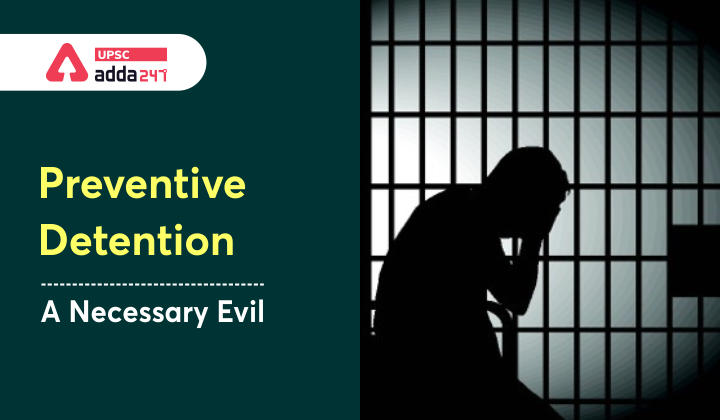Table of Contents
Relevance
GS 2: Indian Constitution—historical underpinnings, evolution, features, amendments, significant provisions and basic structure.
Context
- Recently, a bench of Supreme Court judges ruled that Preventive Detention (PD) should be used only when the detenu is affecting or is likely to affect public order.
Key points of the ruling
- The Court maintained that PD is a necessary evil and must be used only to prevent public disorder.
- PD is not synonymous with the ordinary detention.
- The State must not use PD arbitrarily to deal with the law-and-order problems.
- When a court deals with the PD, one of the foremost questions that need to be asked is whether the ordinary law of the land was sufficient to deal with the situation.
- If the answer is yes, then PD will be declared illegal.
What is preventive detention?
- Preventive detention means detaining an individual who has not yet committed any crime but the administration is of the opinion that, he/she is a threat and, likely to disturb the public order.
 Get free video for UPSC CSE preparation and make your dream of becoming an IAS/IPS/IRS a reality
Get free video for UPSC CSE preparation and make your dream of becoming an IAS/IPS/IRS a reality
Constitutional provision
- Article 22(1) and Article 22(2) of the constitution provides safeguards for the citizens against the misuse of preventive detention. It provides that
- A person cannot be arrested and detained without being informed the grounds of his arrest.
- A person who is arrested cannot be denied to be defended by a legal practitioner of his choice giving him/her the right to defend.
- Every person who has been arrested need to be produced before the nearest magistrate within 24 hours.
- The custody of the detained person cannot be beyond period authorised by the magistrate.
Why needed?
- Complete personal liberty is neither possible nor desirable and restrictions on liberty for State’s security, public order, disruption of national economic discipline, is needed to ensure peace and stability of the society.
- Separatist tendencies: To deal with this issue, strict laws are needed to ensure the indestructible nature of Indian Union. PD is one among those laws.
- PD is not used in general. The number of persons detained in these acts is not large. It means due attention is made before arresting someone under preventive detention.
- To maintain communal harmony in the highly diverse society is a complex affair. Laws like PD has a restraining influence on the anti-social and subversive elements.
- Transnational crimes like hostile activities, espionage, coercion, terrorism, needs an effective instrument to deal with. PD ensures that the integrity and sovereignty of the State is maintained.
Supreme Court Verdict on 97th amendment
Issues
- Instruments like PD is regressive and do not find place in the constitution of any democratic country.
- Arbitrariness: Police determines whether a person poses a threat or not and it is not tested on a trial by leading evidence, neither it is examined by legally trained persons.
- Violation of rights: It violates the Article 21 and Article 19 of Indian constitution, which forms the core of Fundamental Rights.
- It has given wide scope to the administration to torture and practice discriminatory treatment. It does not restrict officials from misusing preventive detention for subversive activities.
- In an unequal society, tools like PD are used against the socio-economically disadvantaged sections of society.
Way forward
- As Supreme Court has said, PD is a necessary evil.
- It might be, sometimes, at loggerheads with the Fundamental Rights. It, however, must function under the broad domain of constitutionalism, at all times.



 TSPSC Group 1 Question Paper 2024, Downl...
TSPSC Group 1 Question Paper 2024, Downl...
 TSPSC Group 1 Answer key 2024 Out, Downl...
TSPSC Group 1 Answer key 2024 Out, Downl...
 UPSC Prelims 2024 Question Paper, Downlo...
UPSC Prelims 2024 Question Paper, Downlo...
